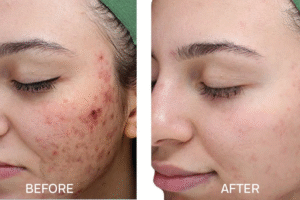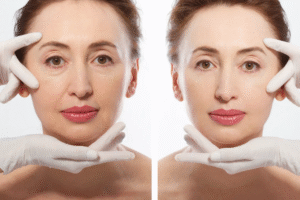Hair loss is a common concern, affecting millions of women worldwide. It can be a sudden and unexpected experience, leaving you feeling confused and frustrated. While hair loss is often associated with men, it’s important to understand the unique causes and treatment options specifically for women. This blog aims to empower you with knowledge and address the emotional impact of hair loss.

Unveiling the Culprits: Why Does Hair Loss Happen in Women?
Hair loss in women can stem from various factors, some more common than others:
- Hormonal Changes: Fluctuations in estrogen and progesterone levels can trigger hair loss, particularly after pregnancy, childbirth, and during menopause.
- Heredity: Female pattern hair loss, also known as androgenetic alopecia, can be hereditary. If hair loss runs in your family, you may be more susceptible.
- Stress: Chronic stress can disrupt the hair growth cycle, leading to temporary or permanent hair loss.
- Medical Conditions: Certain medical conditions, such as thyroid disorders, autoimmune diseases, and PCOS (Polycystic Ovary Syndrome), can contribute to hair loss.
- Medications: Some medications, such as chemotherapy drugs and certain birth control pills, can cause hair loss as a side effect.
- Diet and Nutrition: Deficiencies in essential vitamins and minerals can impact hair health and contribute to hair loss.
- Hairstyles and Treatments: Tight hairstyles or hairstyles that put excessive tension on the scalp, as well as harsh chemical treatments, can damage hair and lead to breakage or hair loss.

Addressing Hair Loss: Exploring Treatment Options
Hair loss doesn’t have to be a permanent concern. Here are some treatment options available for women:
- Medications: Minoxidil is a topical medication clinically proven to promote hair growth in women.
- Hormonal Therapy: In some cases, balancing hormones through medications can help address hair loss caused by hormonal fluctuations.
- Platelet-Rich Plasma (PRP) Therapy: PRP injections can stimulate hair growth by promoting scalp healing and new hair follicle development.
- Laser Therapy: Low-level laser therapy may help increase blood flow to the scalp and stimulate hair growth.
- Hair Transplant Surgery: For women experiencing significant hair loss, hair transplant surgery can be an option to restore hair density.
- Wigs and Hairpieces: Wigs and hairpieces can offer a temporary or long-term solution for hair loss, boosting confidence and self-esteem.

The Emotional Impact: You Are Not Alone
Hair loss can be emotionally challenging for women. It can affect self-confidence, self-esteem, and social interactions. Remember, you are not alone. Many women experience hair loss, and there are resources and support systems available. Here are some tips for coping with the emotional impact:
- Educate Yourself: Knowledge is power. Understanding the cause of your hair loss can help you feel empowered to seek treatment.
- Talk to Your Doctor: Discussing your hair loss concerns with a doctor can lead to a diagnosis and explore treatment options.
- Connect with Others: Sharing your experience with friends, family, or support groups can help you feel less alone and gain valuable insights.
- Focus on Self-Care: Prioritize self-care practices that promote emotional well-being, such as relaxation techniques, exercise, and healthy eating.

Conclusion: Ziva Wellness: Your Partner in Hair Restoration
Hair loss can be a complex issue, but there are solutions available. At Ziva Wellness, we understand the emotional and physical impact of hair loss on women. Our team of experienced professionals can help you determine the cause of your hair loss and explore treatment options tailored to your needs. We are committed to empowering you to regain confidence and feel beautiful in your own skin.
Contact Ziva Wellness today! We are here to support you




